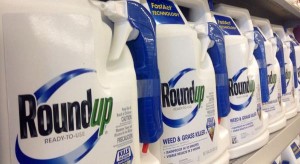El Parlamento Europeo aprueba la entrada de más glifosato. Apoyo, sin embargo, para la prohibición del uso particular y público.
El Parlamento Europeo ha aprobado un nuevo periodo de hasta un máximo de siete años para la entrada del controvertido herbicida glifosato, menos que los quince años que había propuesto la Comisión Europea. El Partido por los Animales defendió la prohibición absoluta del glifosato. “Resulta decepcionante que el Parlamento Europeo también considere más importante el beneficio de las multinacionales que nuestro medioambiente y la salud de personas y animales”, opina la europarlamentaria Anja Hazekamp.

“Es prácticamente imposible escapar a este veneno y hay que sacarlo del mercado ahora que no se puede garantizar la seguridad de personas y animales”, explica Hazekamp. Las propuestas del Partido por los Animales y los verdes holandeses (GroenLinks) para prohibir el uso particular y público en parques y jardines sí obtuvieron el apoyo del Parlamento Europeo.
El glifosato es el herbicida más vendido del mundo. Su veneno mata malas hierbas en jardines y se utiliza a gran escala en la agricultura. La OMS advirtió el pasado año que este veneno posiblemente sea cancerígeno, además de tener un efecto negativo sobre el funcionamiento hormonal. Sin embargo, tanto el fabricante, Monsanto, como la Unión Europea afirman que su uso no implica ningún peligro, motivo por el cual la Comisión Europea había presentado una propuesta para autorizar la entrada de glifosato por un nuevo periodo de quince años.
“El uso extendido y los efectos cancerígenos del glifosato son una combinación muy peligrosa. Este veneno se encuentra en ríos, aguas subterráneas y hasta en nuestros alimentos. Según los estudios existentes, la mitad de los europeos tienen trazas de glifosato en su organismo. Esto es algo que preocupa a mucha gente. Nada menos que dos terceras partes de los europeos quieren que se prohíba el glifosato”, afirma Hazekamp.
La decisión definitiva sobre el glifosato depende ahora de los 28 Estados miembros de la UE. Ha mediados de mayo votarán sobre la aceptación o no de este producto cancerígeno. Francia, Suecia, Italia y Holanda se han manifestado hasta ahora en contra de la renovación del permiso de entrada del glifosato. Pero el secretario de Estado Van Dam comunicó en una carta reciente al parlamento que bajo determinadas condiciones estaría dispuesto a aprobar la entrada de este veneno.
The European Parliament has approved of the readmission of the controversial pesticide glyphosate for maximum seven years. That is shorter than the admission for fifteen years as was proposed by the European Commission. The Party for the Animals called for a total ban of glyphosate. “It is highly disappointing that the European Parliament finds the profits of multinationals such as Monsanto more important than our environment and the health of people and animals,” said MEP Anja Hazekamp.

“This pesticide is hard to avoid and must be taken off the market since the safety of people and animals cannot be guaranteed,” said Hazekamp. The proposals of the Party for the Animals and Green Left to ban private use and the use in public parks and playgrounds were supported in the European Parliament.
Glyphosate is the most sold pesticide in the world. The pesticide kills weed in gardens and is used on a large scale in agriculture. Last year, the World Health Organisation warned that the pesticide is most likely carcinogenic. Additionally, the pesticide may possibly be endocrine disruptors. But its producer Monsanto and the daily European government state that the pesticide is safe for use. The European Commission therefore made a proposal for the readmission of glyphosate for the maximum period of fifteen years.
“The widespread use and the carcinogenic effect of glyphosate are a dangerous combination. This pesticide is found in rivers, in ground water and in our food. Research has proved that half of all people in Europe have levels of glyphosate in their body. Many people are seriously concerned about it, as much as two-thirds of all Europeans want glyphosate to be banned,” according to Hazekamp.
The definitive decision about glyphosate lies with the 28 Member States of the European Union. They will vote on readmission of this cargogenic product in mid-May. France, Sweden, Italy and the Netherlands have objected to renewing the glyphosate admission until now. But State Secretary Van Dam recently informed the Lower House by letter that he wishes to agree to the readmission of the pesticide under certain conditions.